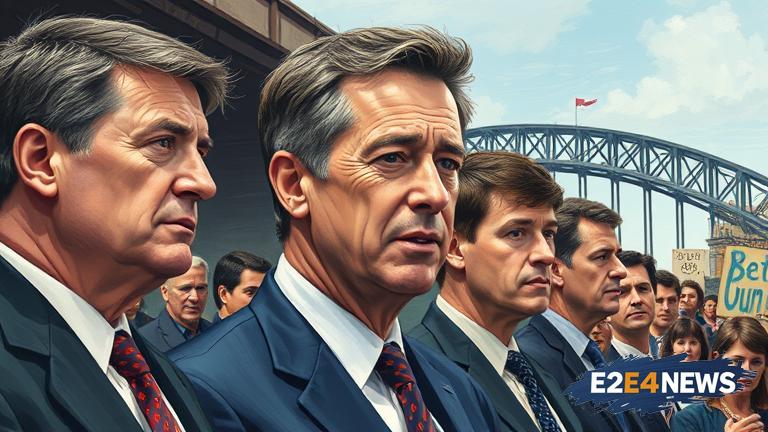The New South Wales government is facing a backlash from its own MPs over its handling of a protest on the Sydney Harbour Bridge, which brought the city to a standstill. Premier Chris Minns is under pressure to take a tougher stance on demonstrations, with some backbenchers calling for stricter laws to prevent similar disruptions in the future. The protest, which was staged by a group of climate activists, saw several people arrested and charged with various offenses. The incident has sparked a heated debate about the right to protest and the need for public safety. Minns has defended his government’s handling of the situation, saying that the police had done a great job in minimizing disruption and keeping the public safe. However, some of his own MPs have expressed concerns that the government is not doing enough to prevent similar protests from happening in the future. The opposition has also weighed in on the issue, with the Liberal Party calling for tougher laws to prevent protests from disrupting major infrastructure. The incident has also raised questions about the use of police resources, with some arguing that the police should be focusing on more serious crimes rather than protests. The government has announced a review of the incident, which will examine the police response and look at ways to prevent similar disruptions in the future. The review will also consider the impact of the protest on the local community and the economy. In the meantime, the government is facing calls to take a tougher stance on protests, with some arguing that the current laws are not sufficient to prevent disruptions. The issue has also sparked a wider debate about the right to protest and the need for public safety, with some arguing that the two are not mutually exclusive. The government will need to balance the right to protest with the need to keep the public safe, and to prevent disruptions to major infrastructure. The incident has also highlighted the need for better communication between the government and the police, as well as between the government and the community. The government will need to work to rebuild trust with the community, and to demonstrate that it is taking the issue seriously. The opposition will continue to pressure the government to take a tougher stance on protests, and to introduce stricter laws to prevent disruptions. The government will need to consider the potential impact of any new laws on the right to protest, and to ensure that they are proportionate and necessary. The incident has also raised questions about the role of the police in managing protests, and the need for better training and resources. The government will need to work to ensure that the police have the necessary resources and training to manage protests effectively, and to minimize disruption to the public. The issue is likely to continue to be a major point of contention in the lead-up to the next election, with the opposition seeking to capitalize on the government’s handling of the incident. The government will need to demonstrate that it is taking the issue seriously, and that it is committed to finding a solution that balances the right to protest with the need for public safety. The incident has also highlighted the need for better communication and coordination between different government agencies, as well as between the government and the community. The government will need to work to improve communication and coordination, and to ensure that all stakeholders are working together to find a solution. The issue is complex and multifaceted, and will require a nuanced and thoughtful approach to resolve. The government will need to consider a range of different perspectives and interests, and to work to find a solution that balances competing demands and priorities.
